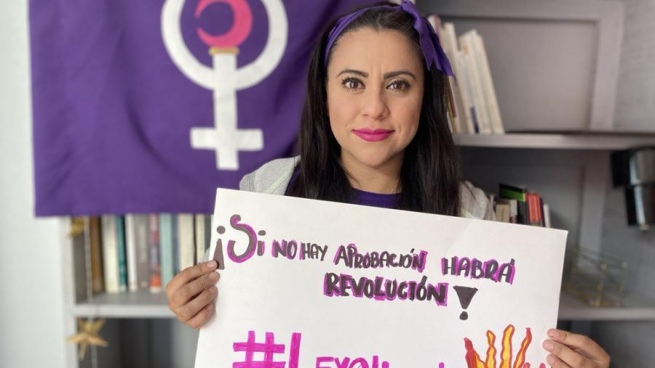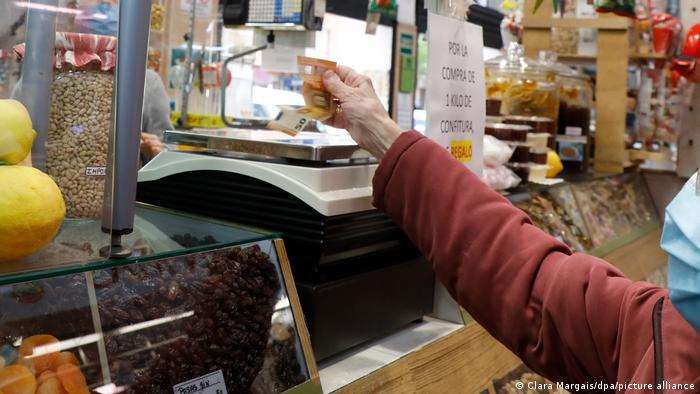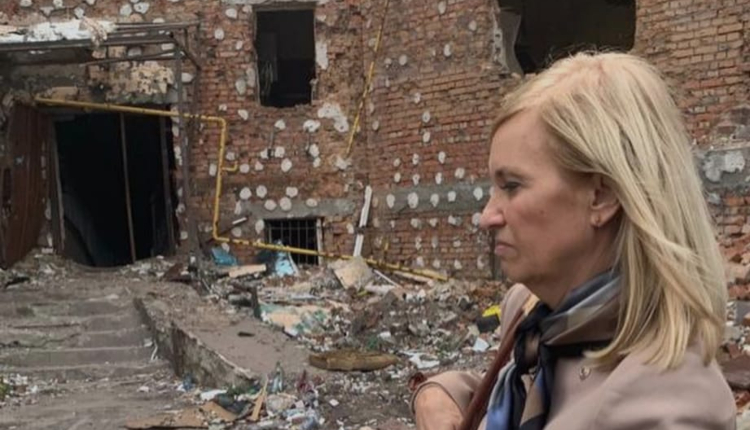The Mexican activist Olimpia Melo arrived in Argentina to promote the bill that bears her name and that seeks to penalize digital violence against women. It was presented on Monday in the Chamber of Deputies, accompanied by more than 27 thousand signatures and had the support of the deputy of the Frente de Todos Mónica Macha and the Minister of Women, Gender and Diversity, Elizabeth Gómez Alcorta.
Melo began his fight at the age of 18 after a video of him having sex went viral. In 2018, he managed to get the Mexican Congress to approve a law that bears his name and penalizes anyone who spreads intimate content with up to six years. In 2021 she was included by Time magazine among the 100 most influential people in the world.
I participated in the presentation of the “Olimpia” and “Belén” bills, which seek to recognize and prevent digital violence against women and LGBTI+ to improve state responses. pic.twitter.com/IbsfC4kFrQ
— Eli Gomez Alcorta (@EliGAlcorta) July 11, 2022
The activist spoke with Télam about that path she traveled and that brought her to Argentina, accompanied by members of the Grupo Ley Olimpia Argentina, who are victims of digital sexual violence in Buenos Aires and the provinces of Santa Fe, Tucumán and Jujuy.
How did the idea of coming to present the bill to Argentina arise?
“Olimpia Argentina Law” was created a year ago at the initiative of colleagues such as Eliana Sotelo, Florencia Villegas, Camila Segli, Emilse Farfán and Florencia Zerde, who had experienced this violence. Then they discovered that we had already brought out the Olimpia law in Mexico and they contacted us, while doing a petition on Change.org for Congress to deal with a similar law in Argentina.

We call it a project but in reality it is a set of reforms…
Yes. It is also a political movement and a cause. What we want is awareness of the use, sale and exploitation of our bodies on the Internet, something that is not legislated or penalized in most Latin American countries. Mexico was the first to do it, and only a few in Europe do it.
We are talking about sexual exploitation and, in most cases, the person who drives it is someone very close to the victim.
The offender tends to be a former partner, current partner, or someone with whom the victim shares a romantic relationship. But that does not mean that he is the only perpetrator.
That violence is not penalized in Argentina either…
In Law 26,485 on violence against women, violence against sexual intimacy that implies the non-consensual and unauthorized dissemination and production of intimate sexual material is not criminalized.
your own story
Did you know of any cases of digital sexual violence before becoming a victim?
No. I was 18 years old when I recorded a sexual video with my partner, a boyfriend at the time who asked me to “sext”, an acronym between sex and text, which is the virtual exchange of sexual content, with consent. We had sex and recorded ourselves with a cell phone. But that video began to go viral on Facebook, Twitter and Instagram. Later, on porn pages, which are markets for online sexual exploitation.
I became a hashtag: #OlimpiaLaGordibuenaDeHuachinango. I don’t live in Mexico City, I live in a town with 80,000 inhabitants. The whole town saw my video, they saw me naked and they all judged me. I was a “whore” or a “slut” because I had allowed myself to be recorded. There was a municipal newspaper where they took screenshots of the video and the copies were sold at the magazine kiosk for five pesos. I left school and work. I went eight months without going anywhere.
How did you manage to get out of that situation?
Those images reached my family. They were brought by my 14-year-old brother who received the video on Whatsapp. Then my mom asked me if I would have wanted that video to be shared. When I told her no, she told me that it wasn’t my fault then. That she didn’t have to be ashamed. That she had no shame because it was not a video in which I was stealing, or being corrupt. Later she told me an iconic phrase: “We all fuck. The difference is that they see you doing it and that doesn’t make you a criminal.”
Somehow, your mom’s sisterhood saved you…
That day I discovered three things: that I had a safe space that neither society nor the State had given me, but my family gave it to me; that the sorority existed, women as allies and not as rivals like my mother, Josefina, did, even though she did not finish high school because she had me when she was 17 and my grandmother was not a wealthy woman. And the third thing I knew was the worthy fight. My mother encouraged me to fight and try to help other women who had been victims and did not have that support. We had nothing because it wasn’t even a crime.
How did you prepare the bill with reforms to penalize digital sexual violence?
When this happened I was studying Law. I knew who my deputy was, and the mechanism to elaborate a law. When I discovered that there was a legislative loophole on the subject, I felt very powerful, because I could make a contribution. I began to study and ask for help. I turned my pain into action. Some said I was crazy, they asked me if I wanted to create a virtual prison for these crimes.

This is how the law that bears your name came about…
I presented it as a comprehensive project for digital violence that included the creation of a prosecutor’s office specializing in digital crimes and expanding the assets of the Cyber Police. When it was approved, a newspaper interviewed me and asked me if it was the “Olympia Law”, and since then it has stuck with that name. At first I didn’t like it because I thought to find out why it was called that, everyone would go find the video and watch it. But later my companions in struggle made me see that the victims deserve that recognition. Now I believe that I am not the Olympia of the video, I am the Olympia of the law. A law that served, after the massive violation that we had of our body in the networks to prevent other women from being raped like us.
You consider it a “gang rape”…
Yes, because the perpetrator is not only the one who made it viral, but also those who share it, those who “like” it. You have to learn to live with these contents, as if they were a tattoo on your skin.
Is there no way to remove those contents?
Not for now. But our experience in Mexico is that, as a result of the approval of the Olympia law, the circulation of this intimate content decreased in a very significant way, because society understood that it is penalized. As a result of that we have eight sentences in Mexico on this type of violence. We not only made a legislative reform, what we did was a social project to change the head.
That is what you and the members of Grupo Ley Olimpia now want for Argentina.
On Monday I told the Argentine Congress that we do not want them to raise their hands in favor of the law, we want them to delete those videos from their cell phones. We want people to be told that it is wrong to share an intimate sexual photograph without consent. Someone may be enjoying it, eroticizing you with a video, but on the other side is a woman like Belén San Román, the police officer who committed suicide due to the dissemination of that content.
Netflix, Time and a book of stories for girls
In the powerful world of Olimpia, a documentary filmed by the independent production company Chumbera Producciones is worth more than the most popular Netflix series, and an illustration that includes it in a book for girls, much more than its inclusion in an issue of Time magazine , as one of the most influential personalities in the world.

One of the most watched Netflix series, “Intimacy”, fictionalizes this topic of the viralization of intimate content. did you see her?
Capitalism always takes our real stories to fuck. If Netflix cared about the cause, it could have done it more symbolically. Like the people from Chumbera Producciones who are making a documentary about our struggle. We did it without money, without capitalism. We are real stories. I’m glad, anyway, because it creates massive awareness. But he is still Eurocentric, a colonizer of a cause that has names and surnames in Latin America and that has a skin color like ours, Latino.
Do you see yourself in the future as a legislator, promoting other reforms in favor of women?
I only hope that we, or the generations to come, can also be safe on the Internet and if that and for that it is necessary for women to do the algorithm, then let’s do the algorithm ourselves.
I’m going to be arrogant and I apologize for that, but we don’t need to be deputies to be legislators. We have our own political movement, the feminist one. We have our cause, our own flag, and a strength that no party has: the strength of being friends.
In 2021, Time magazine chose you as one of the most influential people in the world… what does that distinction mean to you?
It took me by surprise. I was in Tlatelolco walking with my dogs when they told me. I didn’t quite understand what it meant. Today I see that for certain social classes it is important. For those who run the world. It allowed me to speak with Bill Gates, with Tamara Burque, who started #MeToo, with women of African descent who fight all over the world, with leaders who are promoting the Olympia law in Peru and Colombia today.
Recently, the book for girls “Stories of cool Mexican women for really cool readers” by Luciana Biondo and Inés Hüni, which rescues the profiles of inspiring Mexican women, was presented in your country. Is it another distinction that amplifies the message?
Yes. It is the book of two Argentine women who live in Mexico and seek to make the stories of different Mexican women visible. In the second edition I come out with a beautiful image that its illustrators made for me. That makes me feel much more special than Time because when the girls open a storybook they will read that Pancho Villa is not the hero of Mexico, nor is it Christopher Columbus, the hero of the Americas, that we are women from different spaces , from different regions that we fight for and who are also the heroines who fight in a world where women have been silenced, in a world where girls have their clitoris cut off so they don’t feel pleasure, in a world where women are completely oppressed. So, it gives me hope that that image can encourage those girls to want to fight.
















